May 30, 2025 | 02:39 GMT +7
May 30, 2025 | 02:39 GMT +7
Hotline: 0913.378.918
May 30, 2025 | 02:39 GMT +7
Hotline: 0913.378.918
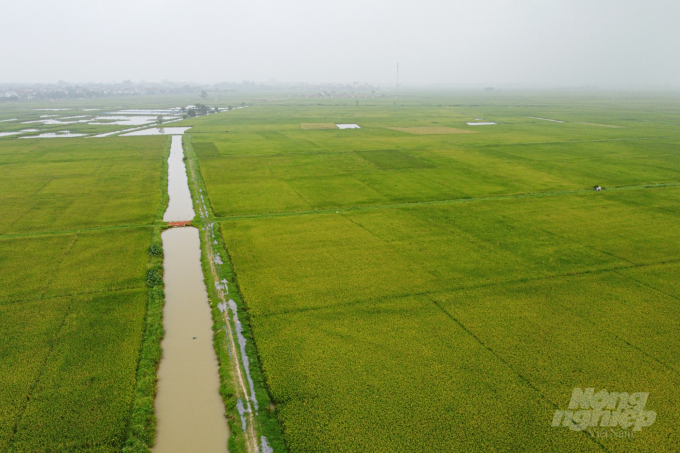
Currently, Hanoi has more than 70% of rice area applying partial SRI method. Photo: Tung Dinh.
By the spring crop of 2022, more than 70 percent of Hanoi's 83,000 hectares of rice land have implemented a partial System of Rice Intensification (SRI) and around 6 percent have adopted the entire SRI.
Nguyen Manh Phuong, deputy director of the Hanoi Department of Agriculture and Rural Development, stated that in the face of rising fertilizer and plant protection agent prices, the capital agriculture industry is promoting the use of SRI, particularly comprehensive SRI. The method of cultivation can reduce the amount of seeds, fertilizer, pesticides, irrigation water, and greenhouse gas emissions.
To support this movement, the capital agriculture has insulted the local authorities to provide proper policies for farmers to use SRI in nearly all rice-growing areas.
Regarding the benefits of SRI, Mr. Le Xuan Truong, Deputy Director of the Hanoi Sub-department of Crop Production and Plant Protection, stated that the number of seeds may be reduced by 50 to 70 percent with entire adoption of SRI. Due to sparse density, the amount of fertilizer used decreases proportionally. The amount of water used to irrigate the rice paddies is reduced by two to three times compared to conventional farming.
Following the initial application of this innovative cultivation technique, the rice plant's roots develop vigorously and penetrate the soil deeply, decreasing the risk of collapse.
In addition, it improves photosynthesis, resiliency, and pest and disease resistance compared to conventional methods.
In addition, the efficient use of water and the decrease of field flooding time contribute to the reduction of greenhouse gas emissions and climate change in rice cultivation. This is the primary objective of the country's agricultural industry.

This year's spring crop, the rice areas applying SRI in Hanoi are completely disease-free, ensuring high yields despite very unusual weather conditions. Photo: Tung Dinh.
In the spring crop of 2022, there are more than 8,000 hectares of rice in the Ung Hoa district, of which roughly 70 percent are high-quality rice varieties, the majority of which are J02 and Bac Thom 7 varieties, and the remaining 30 percent are pure rice varieties.
Since the majority of the land is planted with high-quality seeds, the implementation of advanced farming techniques SRI has enabled farmers to cut costs, enhance quality, facilitate consumption, and increase economic efficiency.
Mr. Le Xuan Truong, after addressing the SRI universalization process with the farmers of the capital, determined that changing the farmers' awareness and habits is the most difficult task.
During implementation, the visible benefits of the SRI method have convinced rice farmers to alter their mindset and practices. As a consequence, more than two-thirds of rice fields have employed SRI.
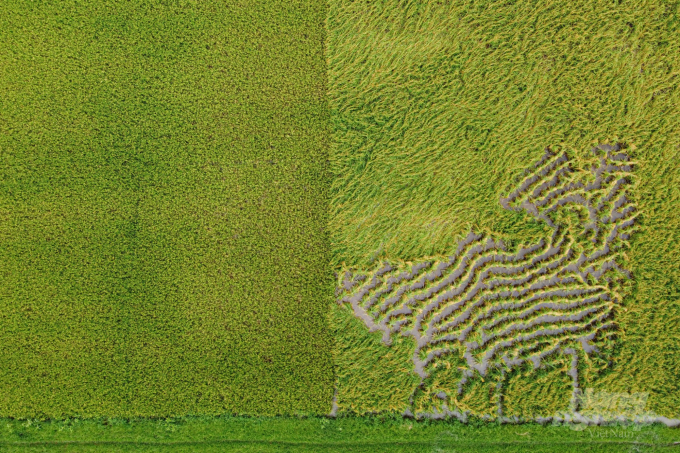
The rice area applying SRI (left) is sturdy, and harder to collapse under the same rainy conditions over the past time than the traditional farming field (right). Photo: Tung Dinh.
Ms. Nguyen Thi Tam of Hop Tien commune, My Duc district, was the first farmer in the city to switch from conventional to SRI farming. She said that she adopted SRI in 2006 with the assistance of local agricultural extension and plant protection agencies. Everyone first believed that SRI would be difficult to access, but following its adoption, it proved to be simple and efficient. According to SRI, the roots of rice plants are healthier, longer, and thicker.
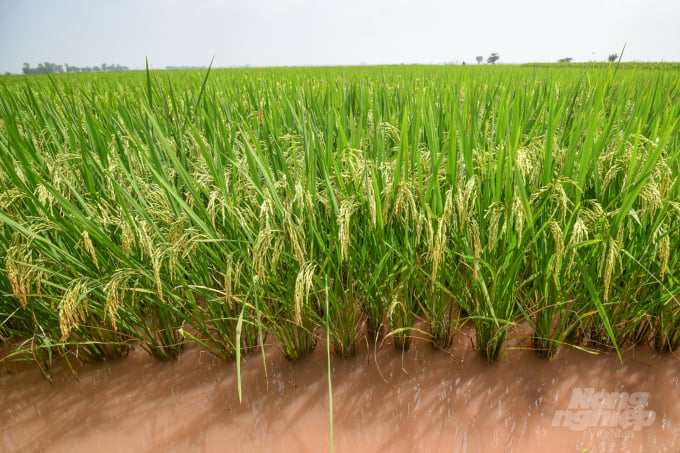
The noticeable feature of SRI-applied rice is that it has few stalks, and sparse clusters, which makes many people initially not believe in the effectiveness of this method. Photo: Duy Hoc.
Since the implementation of SRI, thanks to the restriction of pesticide spraying, the ecological environment of the field is always fresh. The fields witness the flush of shrimp, fish, crabs, eels, etc., leaf rollers have nearly vanished, with the exception of a few diseases such as stripe spot and leaf blight, which are caused by late fertilization.
In Hop Tien commune (District of My Duc), the Hop Tien cooperative has more than 4,000 members, the rice-growing area exceeds 500 hectares, and SRI has been applied to 100 percent of the land.
Mr. Nguyen Ha Tuyen, the director of the cooperative, stated that local farmers first had access to SRI in 2003 through training courses and experimental small plots and that since 2006, the organization has implemented SRI for better farming over the whole land.
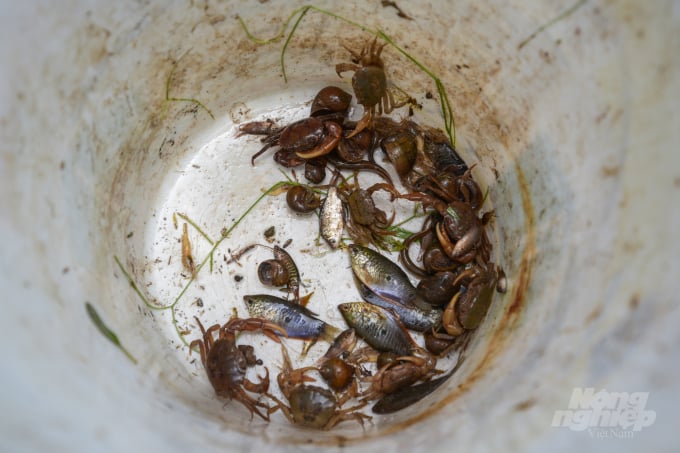
The rice fields applying SRI are always full of crabs, snails, and eels among others. Photo: Duy Hoc.
Since the implementation of SRI, the Hop Tien Cooperative's members are delighted, as they not only boost their economic efficiency but also feel safer about their health, as there is almost no need to use pesticides in rice farming.
Hop Tien cooperative has around 250 hectares of rice variety VNR20 of Vinaseed Group with resistance to pests, hardiness, and extremely steady output, which can reach 72-73 quintals per hectare for this year's spring harvest. 65 hectares of these 250 hectares are sold to Vinaseed for seed production.
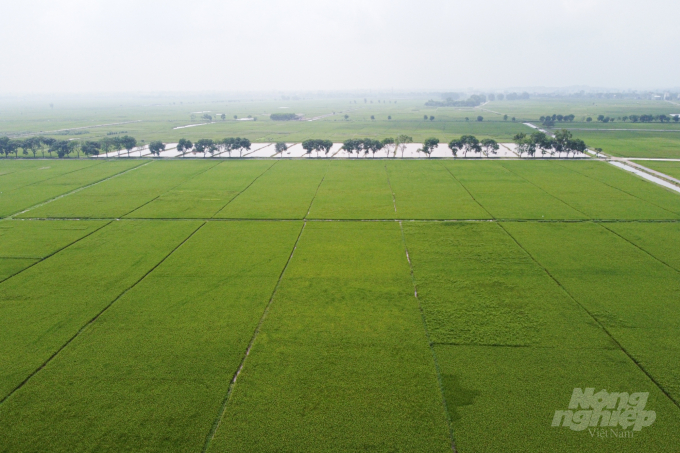
The rice fields are uniform, green, and healthy in My Duc district, Hanoi thanks to the application of SRI. Photo: Tung Dinh.
"3 rises" when implementing SRI will be an improvement in production, such as the spring harvest of 2022 reaching 70–71 quintals/hectare; an increase in rice quality; and an increase in economic efficiency, the unavoidable outcome of the aforementioned advantages.
According to Mr. Nguyen Manh Phuong, Deputy Director of the Hanoi Department of Agriculture and Rural Development, the most challenging aspect of growing the total SRI area is still the process of supplying and retreating water from rice fields. Therefore, the Department of Agriculture and Rural Development of Hanoi proposes that the Ministry of Agriculture and Rural Development and the City establish mechanisms and policies to support businesses that may stimulate investment in improving the irrigation system in order to resolve this issue.
Translated by Linh Linh
/2025/05/25/4127-3-073637_820.jpg)
(VAN) Thanks to the promotion from an FAO-implemented project, vegetable production in greenhouses in Moc Chau has seen strong development, from 1.5 hectares in 2021 to nearly 50 hectares in 2024.

(VAN) FAO has recently supported USD 140,000 to implement the project 'Risk mitigation human-animal interface risks through disease control initiatives in pig farming.'

(VAN) The People's Committee of Tra Vinh province has approved an adjustment to the investment policy for the Green Hydrogen Plant project, increasing its area to approximately 52.76 hectares.
![Reducing emissions from rice fields: [2] Farmers’ commitment to the soil](https://t.ex-cdn.com/nongnghiepmoitruong.vn/608w/files/news/2025/05/05/dsc08881jpg-nongnghiep-140632.jpg)
(VAN) Clean rice cultivation model in Thuong Tan commune, Bac Tan Uyen district, is assisting local residents in achieving sustainable agriculture by substantially reducing costs, increasing productivity, and protecting the environment.

(VAN) At the conference to disseminate Resolution No. 68, AgriS introduced its digital agricultural ecosystem and reaffirmed its commitment to accompanying the Government in promoting private sector development and sustainable agriculture.

(VAN) 'Blue Ocean - Blue Foods' initiative is designed to restore marine ecosystems and establish sustainable livelihoods for local communities by cultivating a minimum of 1,000 hectares of cottonii seaweed in the first three years.
/2025/05/21/4642-3-112707_603.jpg)
(VAN) The V-SCOPE project has made direct contributions to three out of six pillars of the Comprehensive Strategic Partnership between Vietnam and Australia.